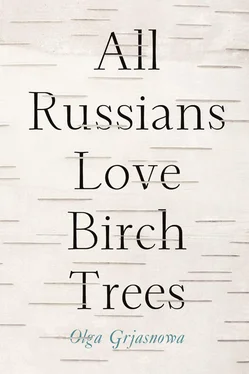“You look pale,” Cem said.
The top buttons of his shirt were open, a golden crescent glistened on his chest. Cem had an uneven growth of beard, with a hairless patch on his right cheek.
I sat down across from him. He was the first person in his family to go to university and speak better Turkish than his parents. Cem had been born in Frankfurt and raised bilingually. At least that’s what he thought. It wasn’t until a vacation in Istanbul that he realized that he had a strong dialect. He often had to search for words. And so he spent a year at Istanbul’s best university and acquired the refined accent of the city’s upper class. With his relatives he kept speaking in the dialect of the village they came from before moving to Germany. We spoke German with each other — two perfectly integrated model foreigners. As Azerbaijani and Turkish are similar enough that we could understand each other, I told him in my language of the practical jokes we played as kids, and he imitated his parents’ or aunts’ Turkish. Sometimes he laughed about the archaic terms that I used, deducing them from Azerbaijani.
“What are you drinking?” I asked.
“Whiskey.”
“Isn’t it a little early for that?”
“ Çüs .”
“When’s your exam?”
“In four days, but we’re partying tonight.”
“I don’t want to.”
“Of course you want to. You’ve been in the hospital all day. Tonight you’re going out with me. Come on, you need it just as much as I do.” He grinned and downed his drink. “But first, take a look at my translation.”
The waiter put two glasses and a bowl of peanuts on our table. Cem shot a longing glance at his unopened pack of cigarettes. The package warned of death. I knew that Cem was imagining the crackling noise of the plastic wrap, the tearing of the silver paper, the taste of the filter in his mouth, the click of the lighter, and the first inhale. But maybe he was just thinking of the waiter.
“How is he?” asked Cem.
“Elisha? Crappy. He’s in a lot of pain. I try to distract him, but it doesn’t work.”
“Does he get on your nerves?”
“What kind of a question is that?”
“Well, does he?”
I took a peanut, felt the salty taste on my tongue, and chewed it up.
“I’m sorry,” said Cem.
CNN was reporting on the Middle East. A demonstration with angry men wearing keffiyehs and waving Palestinian flags marched through Gaza. Interspersed were sequences with destroyed houses and Israeli tanks. Cem shook his head and took a sip.
“What’s going on?” I asked.
He inhaled through his nose and answered: “War.”
“I don’t think so,” I said. Cem looked at me, amused. I added: “We won’t know if there’ll be war until there’s a long talk with a correspondent.”
“Looks like there will be. My father already talked about donating for refugees.”
“Doesn’t he say that every time?” My voice sounded more aggressive than I had intended.
“Exactly.” Cem stretched his back, turned his head left and right. His neck cracked loudly. He glanced at the TV, yawned. “Exactly,” he repeated. “In the end, Dad prefers to spend the money on lottery tickets anyway.” Cem laughed joylessly.
“They always show the same thing,” I said. “Just look at it. Pictures of victims and aggressors in a quick sequence. First the text: the Israeli actions are aggressive and disproportionate. And they go deep into Palestinian territory. Then pictures of victims: maltreated mothers crying for their martyrs on the sunbaked ground, blazing fires and Israeli tanks and checkpoints off in the distance.”
“And you? You think all of that isn’t real? Don’t be so naive,” he said. CNN showed a blond American journalist gesticulating with concern into the camera.
“The journalists aren’t even allowed to enter the territory. They stand on the hill in front of it.”
“And write whatever the Israeli military dictates,” came Cem’s cynical response.
“If they don’t speak Hebrew or Arabic—”
“Well, they should take you, then, shouldn’t they?” he interrupted.
“Asshole.”
“Don’t get so worked up over it. Not everybody’s underqualified just because they don’t have a double major.”
I got up and went to the bathroom. I held my hands under the warm water and tried to localize my anger. I felt like I had to defend something that under different circumstances I would criticize.
There was a knock on the bathroom door. Cem poked his head in and looked around carefully. His eyes were large and green, like a deep lake early in the morning. He said he didn’t want to come in, because it was the women’s bathroom. His voice was shaky. I said I didn’t care if he came in or not. He asked if other women were in the bathroom. I said that I cared even less. He came in.
“Come on.” Cem said. “Let’s go back. There are plenty of other wars on TV.” He put his arms around me. “I have an orange. Do you want it? Please stop. Did you know that there are tunnels underneath all of Gaza and that there are more Mercedes than here? Seriously, Gaza will soon get its own Goethestrasse.”
I buried my face in his shirt. Cem smelled like good intentions and expensive cologne. He held me tight and whispered, “It’s going to be OK. He’ll be back soon.”

The walls were covered in silk tapestries, white flowers on scarlet red fabric, interwoven with gold strands. I stood in a former brothel in the area close to the central station and looked around. Heavy, artfully cast golden frames decorated the walls, couches and chairs were covered with red velvet. A bartender wore rouge and a tiara, another a nylon stocking on his head. Both served with demonstrative disinterest. Gorgeous girls with shiny mouths and sweet perfume danced to the beat of aggressive house music. The young beauties knew how to accessorize a fetish. Many wore masks and feathers. The men were scantily clad and tried to look like catamites. Everyone smiled, danced, flirted.
I adjusted my dress in front of a mirror. Sami casually leaned on a column. He wore dark jeans and a black leather jacket and was giving the girl next to him a light. The girl was very blond and the contours of her small breasts showed against the thin fabric of her tight dress.
I approached Sami from behind and placed my hand on his broad back. The gesture was both instinctive and surprising, and I stood there with my hand on his back, unsure what to do next. When he turned and smiled at me, I heard myself say, “I didn’t know you were in Frankfurt.”
The hug was friendly and when we came apart he rested his hand on my arm for a moment. I didn’t move until he let go.
“For a month now,” said Sami.
“How long are you staying?”
The girl in Sami’s company made a show of yawning. I looked at her condescendingly, trying to place all my hatred into this glance, but she ignored me.
“Not longer than necessary,” said Sami. “My student visa ran out and I’m waiting for it to get renewed. I’m crashing with my parents and visiting old friends.”
Both of us took an awkward sip of our beers. The other girl whispered something into Sami’s ear, ran her tongue across her teeth, and finally left.
“Masha, I wanted to call you, but I didn’t quite know …”
Sami came closer, so that his mouth was close to mine. I stood up on the tips of my toes, stroked his hair out of his face, and kissed his forehead.
“I missed you.” Sami breathed into my ear as he had done in the past when we made love. We breathed heavily and almost in the same rhythm. Sami looked like someone who knew exactly what constituted a good life, where to get it, how to hold on to it, and, in the end, how to cast it out before it got too boring. In short: he had the air of something dangerous without being daunting. His gaze was always a little too serious. I found his nose very erotic. It had a little bump that he’d acquired in a fight in a rural disco that he had started himself.
Читать дальше













